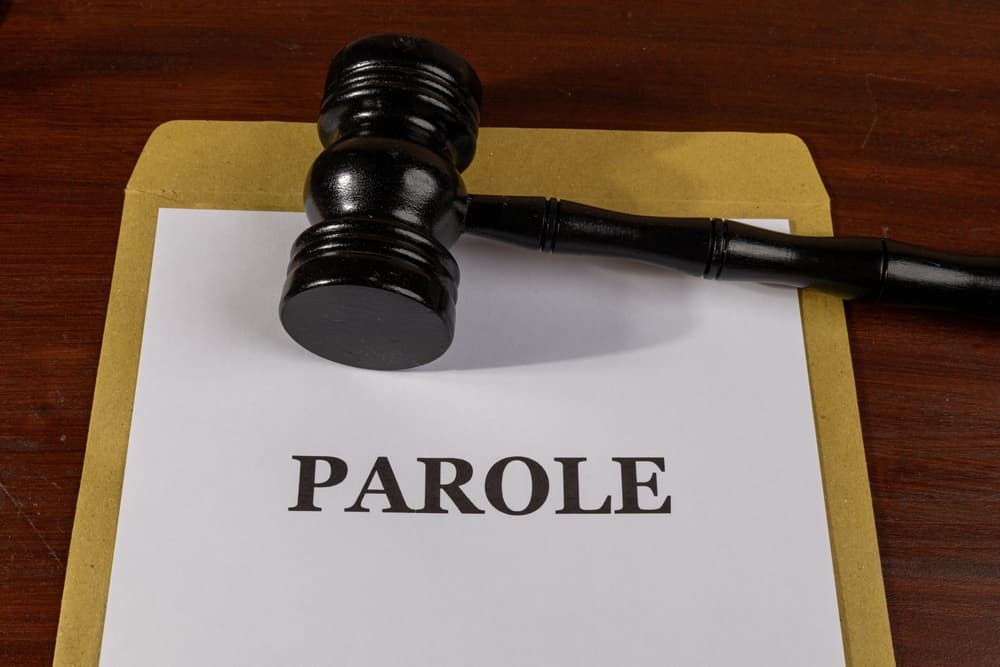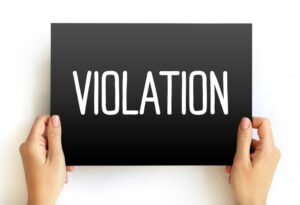What Is a Parole Violation?

Getting out of prison and being placed on parole is a moment of hope. It is a chance to start over, reconnect with family, and build a new life. However, freedom on parole comes with very strict rules. You are not completely free; you are serving the rest of your sentence in the community under the close watch of a parole officer.
Following every single rule can be very difficult. A simple mistake or a bad decision can lead to an accusation of a parole violation. And a parole violation is a serious problem that can send you right back to prison. It is one of the most stressful situations a person can face. Your freedom is on the line all over again.
If someone accuses you or a loved one of violating parole, you must understand what that means and what is at stake. You must also know that you have the right to fight the accusation. This article will explain what parole is, the rules you must follow, the different kinds of violations, and what happens during the revocation process. Most importantly, it will explain how an experienced parole violation attorney in LA can protect your rights.
Key Takeaways
-
Parole allows early release from prison under strict supervision, but even minor mistakes can lead to serious consequences.
-
Violations fall into two categories: technical violations (like missed meetings or failed tests) and new law violations (committing another crime).
-
If accused, you have important due process rights — including the right to written notice, a hearing, and legal representation.
-
A parole violation attorney can challenge the evidence, cross-examine witnesses, and argue for lesser sanctions instead of revocation.
-
Having skilled legal help can make the difference between returning to prison and keeping your freedom while rebuilding your life.
What Are the Rules? Understanding the Conditions of Parole

Parole is a period of conditional release from prison. The state allows you to serve the final portion of your sentence in the community instead of behind bars. The purpose of this supervision is to help people transition back into society while still protecting public safety. You must agree to follow strict rules in exchange for this early release. These rules are called the “conditions of parole.”
Every person on parole has a parole officer. This officer’s job is to monitor you and ensure you follow all the rules. The parole authority has the power to establish the specific conditions of a person’s release, which courts tailor to the individual and their original crime.
Common conditions of parole often include:
- Reporting to your parole officer: You must meet with your officer as often as they tell you, weekly or monthly.
- Obeying all laws: You cannot be arrested for or commit any new crime.
- Submitting to searches: You must agree to let your parole officer search your person, your home, or your car at any time, without a warrant.
- No drug or alcohol use: You are usually required to stay away from illegal drugs and may have to submit to regular drug testing.
- Travel restrictions: You typically cannot leave the state or even your county without getting permission from your parole officer first.
- Maintaining a residence: You must live at an address that your parole officer has approved, and you cannot move without permission.
- No contact with victims or co-defendants: The court will order you to avoid the victim of your crime and anyone involved with you.
- Attending programs: You may be required to attend counseling, anger management classes, or substance abuse treatment programs.
When you’re released, parole officers will give you a written copy of your conditions. It is your responsibility to know every rule and follow it perfectly.
Two Types of Parole Violations
A parole violation is an accusation that you broke one of these rules. There are two main types.
A Technical Violation
A technical violation occurs when you break one of the specific rules of your parole but have not committed a new crime. These are the most common types of violations.
Examples include:
- Missing a meeting with your parole officer.
- Failing a drug test.
- Being out past a required curfew.
- Traveling out of the county without permission.
- Failing to look for a job or attend a required program.
While these might seem minor mistakes, the parole system takes them seriously. Any one of them can be enough to start the violation process.
A New Law Violation
This is the most serious type of violation. It means you have been arrested and charged with committing a brand-new crime while on parole. This can be anything from a misdemeanor, like shoplifting, to a serious and violent felony. If a court convicts you of a new crime, it will sentence you for that offense and almost certainly revoke your parole, sending you back to prison.
What Happens When Someone Accuses You of a Parole Violation?

When your parole officer believes you have violated a rule, they will start a formal process. The outcome can range from a minor sanction to a full parole revocation.
Intermediate Sanctions and Flash Incarceration
Recently, the system has changed to provide more options for handling minor violations without sending someone back to prison for a long time. The law allows parole agencies to use intermediate sanctions for parole supervision.
These sanctions can include:
- Increased reporting to your parole officer.
- Being placed on electronic monitoring (an ankle bracelet).
- Being ordered into a residential drug or alcohol treatment program.
- There is a new option called “flash incarceration.” This is a short jail stay of up to 10 straight days. It serves as a quick and immediate consequence for a violation without starting the lengthy process of full parole revocation.
The parole officer has the power to impose these sanctions directly. However, if they believe the violation is too serious for these measures, they recommend revoking your parole.
The Parole Revocation Process
If your parole officer decides to seek revocation, they will petition the court or a parole board. You will be arrested and held in custody. You will then have a formal hearing to decide your fate.
Knowing that a parole revocation hearing differs from a criminal trial is important. The standard of proof is much lower. In a criminal trial, the prosecutor must prove you are guilty “beyond a reasonable doubt.” In a parole revocation hearing, the parole agency only has to prove that it is more likely than not that you violated a condition of your parole. This is a much easier standard for them, so having a parole violation attorney is important.
Your Rights at a Parole Revocation Hearing
Even though the standard of proof is lower, you still have due process rights at a revocation hearing. These rights ensure that the process remains fair. Groups like the American Civil Liberties Union (ACLU) have long fought to ensure these protections are in place.
Your rights include:
Your Right to Written Notice of the Allegations
Before the parole agency can try to revoke your parole, it must first tell you exactly what it thinks you did wrong. You have the right to receive written notice. This first step is vital because you cannot defend yourself without knowing the charges against you. This right prevents the parole officer from surprising you with new accusations in the middle of your hearing.
The notice you receive should be clear and specific. The notice should clearly state which parole rule or condition you allegedly violated. For example, it should say, “You failed to report for your scheduled meeting on July 5th,” not just “You were not compliant.” It should also give you a general idea of their evidence against you. A parole violation attorney will review this notice carefully as soon as you receive it. Suppose the notice is too vague or does not give you enough information. In that case, your lawyer can argue that the state violated your due process rights, which can sometimes justify challenging the entire revocation process.
Your Right to Attend the Hearing and Present Your Side
The decision at a revocation hearing concerns your freedom; you have the absolute right to be there. This right ensures that no one makes a decision about you in secret. Being present lets you hear all statements, see the evidence presented against you, and observe the witnesses as they testify.
As importantly, you can speak and tell your side of the story. This is your opportunity to talk directly to the judge or the hearing officer. An experienced criminal defense lawyer will prepare you for what to say, helping you tell your story clearly and persuasively so you do not accidentally say something that hurts your case.
Your Right to Present a Defense with Evidence and Witnesses
The parole agency is not the only side that gets to present a case. You have the right to present evidence that you did not violate your parole, or to argue for a second chance. This means you can actively build a defense instead of just reacting to the accusations. A lawyer who handles parole revocation hearings will gather the proof you need.
This proof can come in many forms. For example, if someone accuses you of missing a meeting, you can present a doctor’s note proving a medical emergency or a receipt from a mechanic showing your car broke down. If someone accuses you of not looking for a job, you can provide a log listing all the places where you applied. You can also present positive evidence, like certificates from your completed treatment programs or letters from your boss praising your hard work. You also have the right to call your witnesses. Your employer, a family member, or a sponsor from a support group can testify on your behalf about your character and your commitment to succeeding on parole.
Your Right to Confront Your Accusers
At the hearing, your attorney can question anyone who presents evidence against you. This is your right to confront and cross-examine witnesses. This is a very powerful tool for finding the truth. After your parole officer or any other witness testifies for the parole agency, your lawyer gets to ask them questions.
This questioning aims to find any weaknesses or inconsistencies in their story. Your lawyer can show that the parole officer’s memory of the event is unclear or that their testimony differs from what they wrote in their official report. Your defense attorney might also ask questions to show that a witness is biased or has a personal reason to lie. This process of cross-examination is a specific skill. A good parole violation attorney knows how to ask questions calmly and focus to show the judge that the testimony against you may not be reliable. This can sometimes cause the entire case against you to fall apart.
Your Right to Be Represented by an Attorney
This may be your most important right because it protects all your other rights. The legal system is confusing, and the rules of a parole hearing are not simple. Having a professional on your side to guide you is a huge advantage. When you have a lawyer, you have someone who understands the law, the procedures, and the people making decisions about your future.
Your parole violation attorney will handle all the difficult parts of the process for you. An experienced criminal defense lawyer in your corner levels the playing field and gives you the best chance to protect your freedom.
A lawyer who handles parole revocation hearings can protect these rights and build a defense for you. They can challenge the parole officer’s evidence, find witnesses to support your story, and argue to the judge or hearing officer on your behalf.
Serious Violations and the Board of Parole Hearings
If the court considers the violation very serious, such as a new violent felony, it may handle your case differently. The state’s Board of Parole Hearings might hold your hearing instead of a local court.. This panel has the authority to decide parole for the state’s most serious offenders. A hearing before this board is very serious, and having an experienced criminal defense lawyer is necessary.
How a Parole Violation Attorney Can Defend You

An experienced parole violation attorney can fight for you in many ways. They can argue that you did not commit a violation. For example, they might show that a failed drug test was a false positive or that you had a valid emergency that caused you to miss a meeting.
If you did commit a violation, your attorney can present mitigating evidence to argue for a lesser sanction. They can show the judge that you are trying your best, that you are employed, and that you have support from your family. They might present evidence from a counselor or sponsor. The goal is to convince the judge or parole board that you deserve another chance and that sending you back to prison is not the right answer. Research from organizations like the Prison Policy Initiative often highlights how technical violations, rather than new crimes, drive reincarceration, an argument a good lawyer can make.
Furthermore, a lawyer can explain the system to you. They know the local parole officers, judges, and procedures. This knowledge is invaluable. Justice reform groups like The Council of State Governments Justice Center provide resources on improving parole systems, but a lawyer provides direct help for your specific case. The Vera Institute of Justice also highlights ways to improve parole to support people’s success.
Contact a Parole Violation Attorney to Prepare Your Defense
If you are facing an accusation of a parole violation, do not wait. Your freedom is at stake. Contact a lawyer who handles parole revocation hearings as soon as possible. They can start preparing your defense and give you the best chance of staying out of prison and continuing to build your life.


